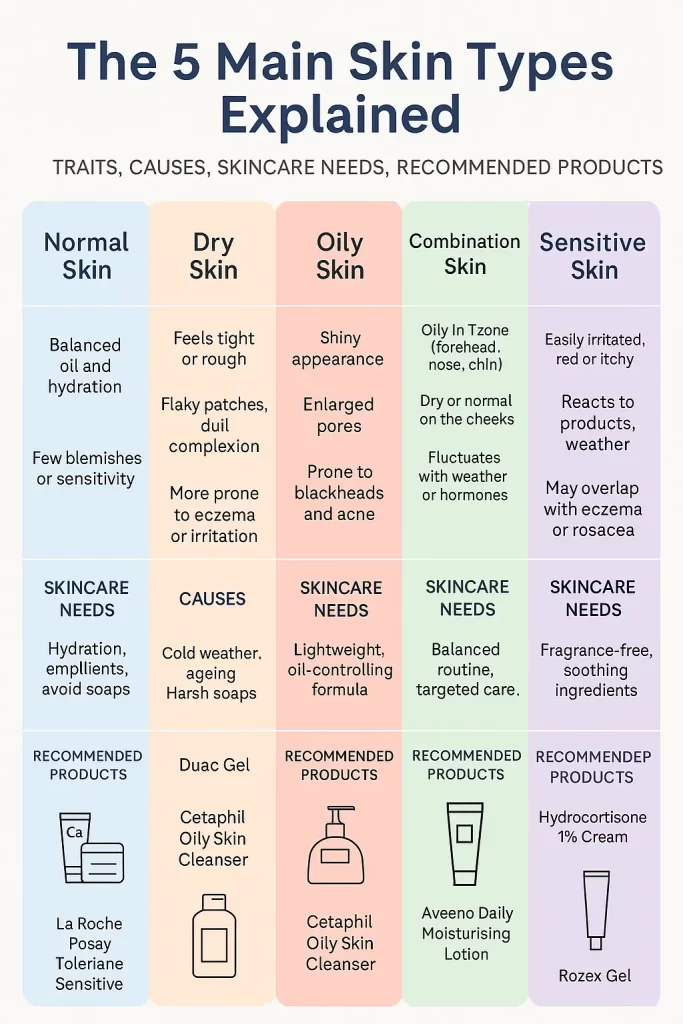Choosing the right skincare routine starts with one essential step: understanding your skin type. Whether you have oily skin prone to breakouts, dry skin that feels tight and flaky, or a combination of both, identifying your skin type is key to selecting the most effective pharmacy skincare products. At OnlineChemist, we help customers across the UK find pharmacist-recommended treatments tailored to their unique skin needs. In this guide, we’ll explain the main skin types, how to test your own at home, and which products work best for each – so you can build a confident and personalised skincare routine.
Understanding your skin type is the foundation of any effective skincare routine. Without this knowledge, you may end up using the wrong products – which can lead to irritation, breakouts, or worsening dryness. Whether you’re dealing with acne, eczema, rosacea, or simply want a balanced skincare routine, knowing your skin type helps you:
Choose the Right Products: Pharmacy skincare is often formulated for specific skin types – oily skin needs lightweight, non-comedogenic options, while dry skin benefits from richer emollients.
Avoid Worsening Skin Issues: Using strong acne treatments on dry or sensitive skin, or heavy creams on oily skin, can create new problems or intensify existing ones.
Tailor Your Routine: Knowing when to exfoliate, how often to cleanse, and what kind of moisturiser to use depends entirely on your skin type.
Save Money and Time: You’ll avoid trial-and-error purchases by starting with products suited to your skin’s natural condition.
Get Better Results from Treatments: Prescription and over-the-counter skincare for conditions like psoriasis, dermatitis, or acne work best when supported by appropriate daily care.
If you’re buying skin treatments online in the UK, this step is especially important – understanding your skin type helps you make informed decisions without needing a face-to-face consultation.

Understanding your skin type is the foundation of any effective skincare routine. Without this knowledge, you may end up using the wrong products – which can lead to irritation, breakouts, or worsening dryness. Whether you’re dealing with acne, eczema, rosacea, or simply want a balanced skincare routine, knowing your skin type helps you:
Choose the Right Products:
Pharmacy skincare is often formulated for specific skin types.
Oily/Acne-Prone Skin: Try Duac Gel or Differin Gel – both help reduce excess oil and unclog pores.
Dry Skin: Products like Epaderm Cream or Aveeno Daily Moisturising Lotion are excellent emollients.
Avoid Worsening Skin Issues:
Using strong treatments meant for oily skin on dry or sensitive skin can cause redness, peeling or discomfort.
Sensitive or Eczema-Prone Skin: Hydrocortisone 1% Cream is a mild steroid suitable for short-term use.
Tailor Your Routine:
Combination Skin: You may need different products for different areas. A gentle cleanser like Cetaphil Gentle Skin Cleanser is suitable for most skin types.
Rosacea: Choose non-irritating treatments such as Rozex Gel, which targets redness and inflammation.
Save Money and Time:
By choosing products aligned with your skin type from the start, you avoid costly mistakes. For example, if you have oily skin, avoid thick ointments like Eumovate Ointment, which may clog pores.
Get Better Results from Treatments:
Condition-specific treatments work best when your skin barrier is healthy. Supporting eczema or dermatitis treatment with Doublebase Gel can improve skin hydration and treatment outcomes.
If you’re buying skin treatments online in the UK, this step is especially important – understanding your skin type helps you make informed decisions without needing a face-to-face consultation.
Identifying your skin type helps you choose the right skincare routine and pharmacy products for long-term skin health. Below are the five main skin types, their signs, causes, and treatment options available from OnlineChemist.
Traits:
Balanced oil and hydration levels
Few blemishes or sensitivity
Smooth texture, small pores
Skincare Needs:
Focus on maintaining hydration and barrier protection. Avoid overloading with actives.
Recommended Products:
CeraVe Foaming Cleanser (for daily cleansing)
La Roche-Posay Toleriane Sensitive (light, barrier-repair moisturiser)
SPF 30+ moisturiser during daytime
Traits:
Feels tight or rough, especially after washing
Flaky patches, dull complexion
More prone to eczema or irritation
Causes:
Cold weather, central heating, ageing, harsh soaps.
Skincare Needs:
Hydration, emollients, and avoiding soaps or alcohol-based products.
Recommended Products:
Epaderm Cream (intensive moisturiser)
Doublebase Gel (hydrating gel for eczema-prone skin)
CeraVe Hydrating Cleanser (soap-free and replenishing)
Traits:
Shiny appearance, especially forehead/nose
Enlarged pores
Prone to blackheads and acne
Causes:
Hormonal imbalances, humid weather, overuse of drying products.
Skincare Needs:
Lightweight, non-comedogenic, oil-controlling ingredients.
Recommended Products:
Duac Gel (treats mild to moderate acne)
Cetaphil Oily Skin Cleanser (gentle, removes excess oil without stripping)
Neutrogena Hydro Boost Gel (oil-free hydration)
Traits:
Oily in the T-zone (forehead, nose, chin)
Dry or normal on the cheeks
Fluctuates with weather or hormones
Skincare Needs:
Balanced routine with targeted care – not too rich, not too drying.
Recommended Products:
Simple Refreshing Facial Wash (mild and non-irritating)
Aveeno Daily Moisturising Lotion (non-comedogenic hydration)
Spot treatments like Differin Gel for breakouts
Traits:
Easily irritated, red or itchy
Reacts to weather, fragrance, new products
May overlap with eczema or rosacea
Causes:
Disrupted skin barrier, allergies, harsh exfoliants or actives.
Skincare Needs:
Fragrance-free, minimal ingredients, soothing and protective care.
Recommended Products:
Hydrocortisone 1% Cream (short-term relief for flare-ups)
Rozex Gel (for rosacea-prone skin)
Cetaphil Gentle Cleanser (non-foaming, soap-free)

Determining your skin type doesn’t require expensive tests. With a few simple steps at home, you can get a good indication of how your skin behaves—helping you choose the right pharmacy skincare products.
Wash your face with a gentle cleanser and pat dry.
Do not apply any moisturiser, serum, or treatment.
Wait 30–60 minutes, then examine your skin in natural light.
What to look for:
Shiny across forehead, nose, and chin? Likely oily.
Tight, flaky, or dull? Likely dry.
Shiny T-zone but dry/normal cheeks? Likely combination.
Slight redness, itching or stinging? Possibly sensitive.
Balanced, no discomfort? Likely normal.
Press separate pieces of blotting paper on different areas of your face (forehead, nose, cheeks, chin).
Hold each up to the light and observe oil residue.
Results:
All sheets show oil: Oily skin
Only T-zone shows oil: Combination skin
Little to no oil: Dry or normal skin
Pay attention to how your skin feels 10–15 minutes after washing:
Tight or uncomfortable? Dry or sensitive
Greasy or shiny quickly? Oily
No strong reaction? Normal
Note changes with weather, stress, diet or hormones. Some people have reactive or fluctuating skin (e.g. combination or sensitive).
Authored by:

BPharm, MPharm, PGDip (Pharmacy), MRPharmS, IP
Pharmacist Independent Prescriber
GPhC Number: 2083409

Online Chemist
82 Middleton Road
Gorleston
Great Yarmouth
Norfolk, NR31 7AH
Phone: 01493 600610
Email: info@onlinechemistuk.net
Superintendent Pharmacist:
Obaidullah Zaman
BPharm, MPharm, PGDip (Pharmacy), MRPharmS, IP
GPhC Reg. Number: 2083409
Pharmacy Premises GPhC Reg. Number: 9011159
Monday 09:00 – 17:00
Tuesday 09:00 – 17:00
Wednesday 09:00 – 17:00
Thursday 09:00 – 17:00
Friday 09:00 – 17:00
Saturday Closed
Sunday Closed
Click here for driving directions
OnlineChemist is a trading name of Nomaz Limited.
Registered in England – 11349276.
© 2025 All rights reserved.